Sweat trickles down our backs, as we brave the unforgiving afternoon sun, meandering through Goidhoo’s vegetable fields. From afar, the island doesn’t look quite so vast, nor does it seem difficult to navigate - but presently abandoned by our motorcycles, the abundance of green does impress.
In the five minutes next to forever, Abdul Bari Ali emerges between stalks and stems; looking very much like the quintessential island farmer complete with a jersey tee, faded jeans, ‘Clint Eastwood’ straw hat, swagger and all.
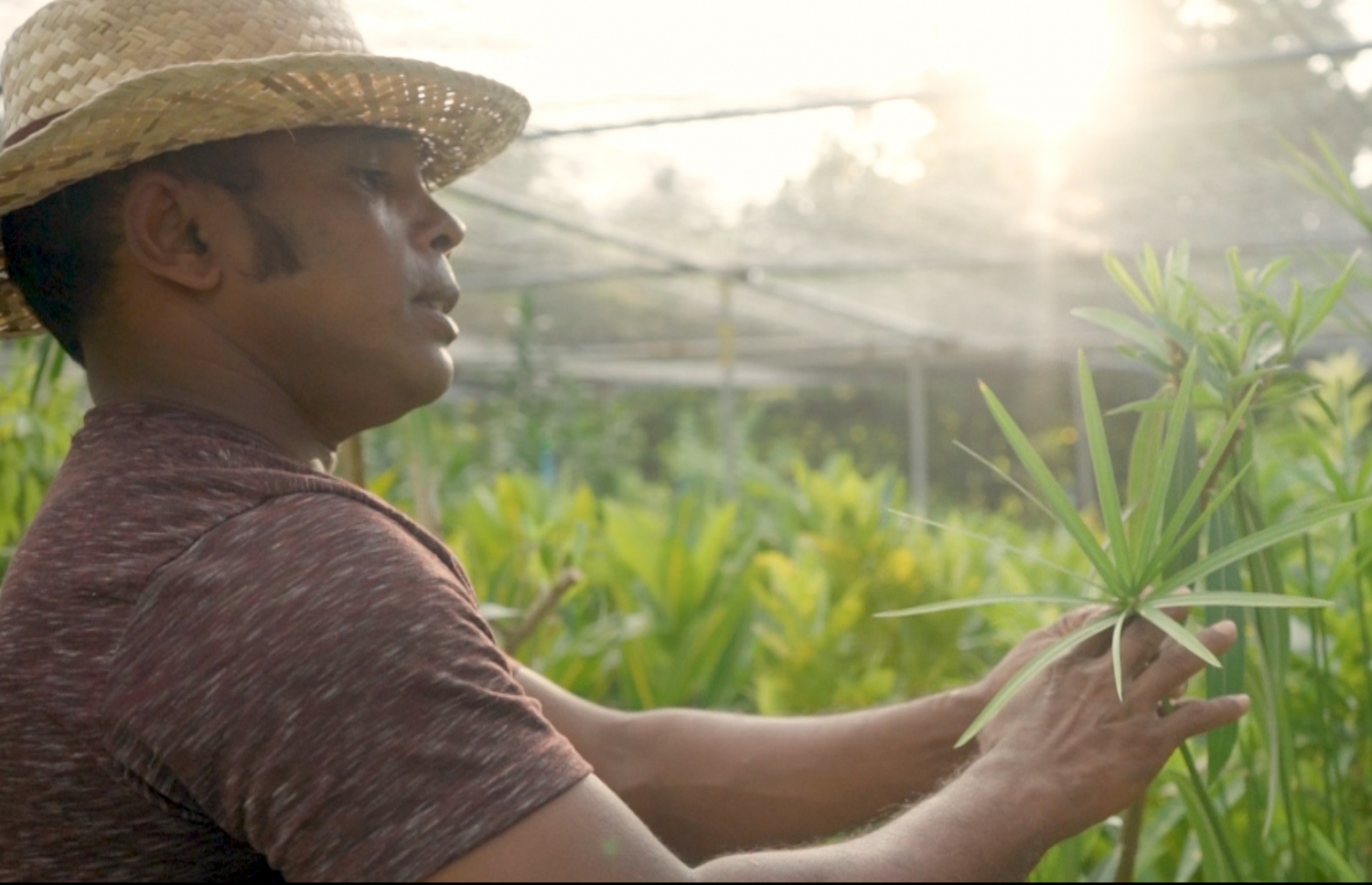
Tall, dark and characteristically mysterious, the Maldivian-Malboro-man demeanour wanes as he speaks, and his soft-spoken words carefully considered, carry the weight of a rather solemn, down-to-earth spirit.
“I’ve never appeared on camera…”, Abdul Bari’s voice wavers unsteadily for a moment, eyes wandering nervously before finding focus on the flower I hold out questioningly. In a split-second, his tone changes, as does the attitude, and off we go on a passionate conversation of all things green and glorious.
“My dabbling in gardening began around 2003”, he says, “So I’ve been doing this for about nine years now”.
Bari’s a self-made man, matching the rugged picture he painted in our minds from the very first impression.
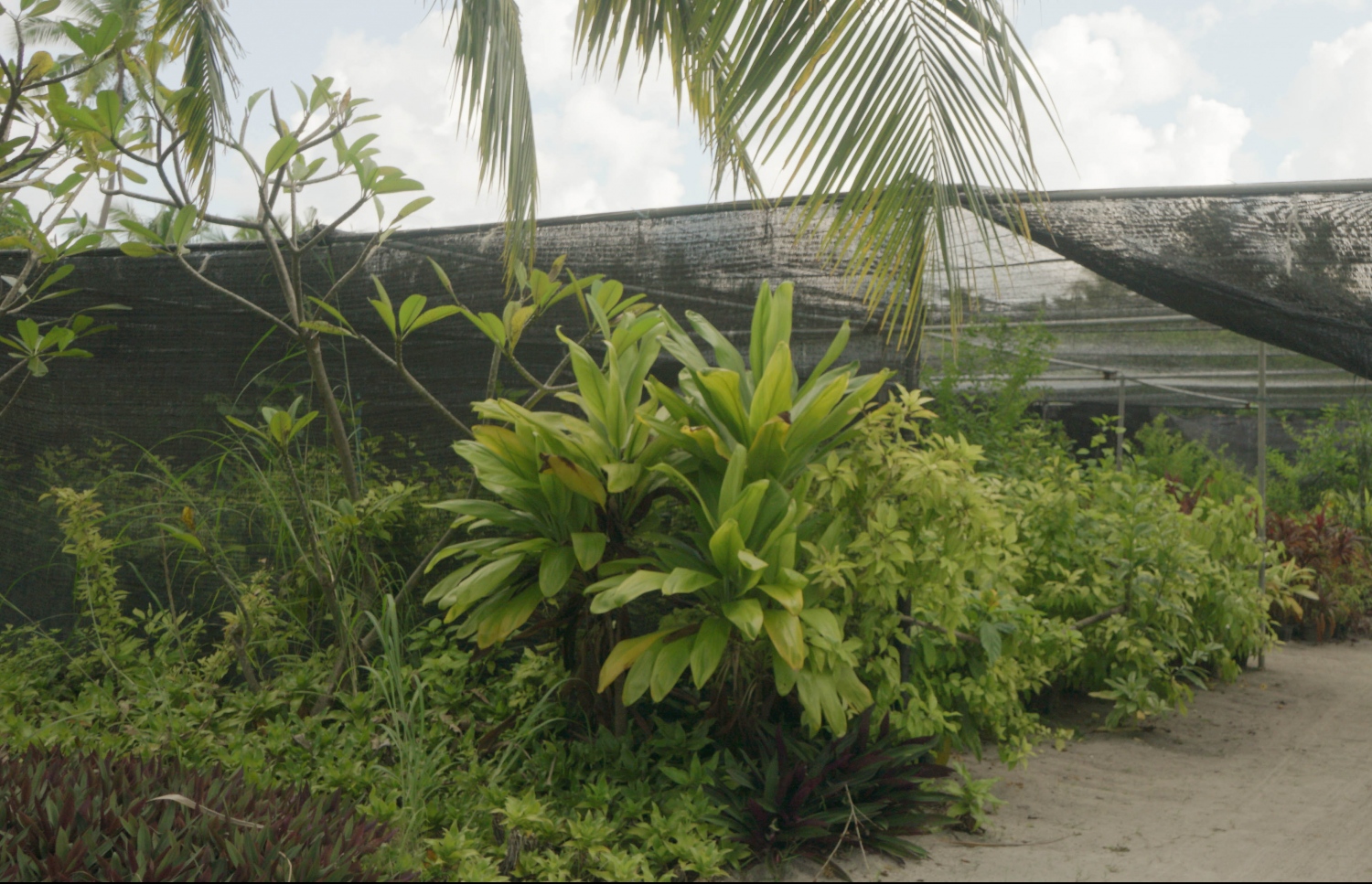
“There were many trials and tribulations of course, but over the course of time, I taught myself”. There’s a deep sense of achievement tinging his voice now. “Eventually, I began passing on that knowledge to others. Today I work alongside apprentices that I have personally trained”.
“What I’ve been doing for a long time now is simply learning from my experiences and applying that to real-life situations. For instance, I’ve experimented with planting several types of trees and plants in an array of locations. I’ve used a variety of methods and applications to cure plant diseases. I constantly try several types of plant foods and administer them in every way I can think of”.
“It has been a creative process for sure, but generally, that is how I’m moving forward”, he said.
Abdul Bari gently caresses a leaf, as he walks us through his vast gardens, describing how he grows his saplings, then introduces them to the market space to be sold to resorts.
“Quite a few purchase from us, nearly all the resorts in this Atoll, at least”, he said. “However, the easy availability of plants from foreign countries at cheap prices does present a problem”.
“I suppose it seems more affordable”, he shrugs, “but while our plants may be a little costlier compared to prices hoteliers are accustomed to, there are certain advantages to purchasing with us.”
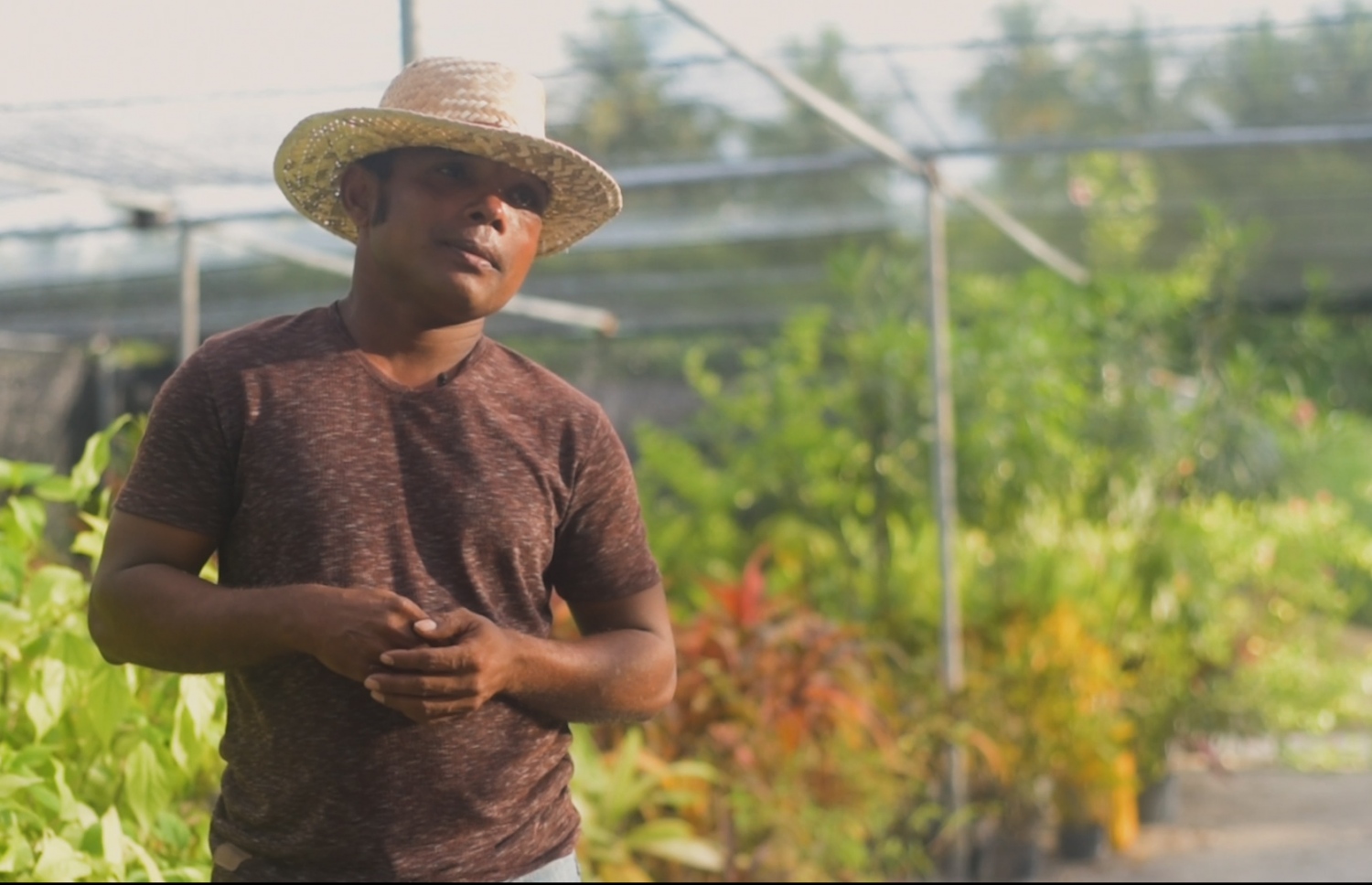
According to Bari, the main problems that arise from importing plants and trees are rooted in transportation. It is common practice to bring plants from countries like Thailand, however, when containers take up to 25 days to arrive, and that too without accounting for possible delays at Customs, it can pose disastrous effects on their condition. Adding to that are the inevitable issues with adjusting to the new environment.
In the case of most species, significant time and a well-controlled environment are required for proper assimilation. This becomes exceedingly difficult in tropical conditions for most plants and trees, especially having been deprived of nurturing ingredients in the faced of travel-induced stress.
“That said, these days more resorts are aware and choose to buy locally, which is good I believe, for us and for them too”, reasons Bari, choosing to end on a more optimistic note.
“In terms of sales, our most popular varieties are that of ‘Magoo Gas’ (Beach Cabbage), ‘Sai Maa’ (Hibiscus) Croton Plant family. The majority of flowering ornamentals are classed as products in high demand.”
Over the years, what first began as one man’s past-time has grown into a profitable business venture that earns a pretty penny for his company, and the islanders that work for him.
“Though we earn on a project to project basis, landscaping for a typical-sized resort is valued at roughly USD 3.5 Million. For larger projects like that of Emboodhoo lagoon, the mark up can be in the range of USD 12 - 16 Million. Really, it all depends on the size of the land”, Bari muses, running his hand along the rim of his hat, deep in thought.
But there’s an activist lurking somewhere beneath the island-cowboy exterior. It is with a true purpose that he speaks of his choice to work exclusively with local Goidhoo folk.
“Whenever we score a project, we use local talents throughout the landscaping process”, he affirms.
An individual ‘Magoo Gas’ earns MVR 6 for a Goidhoo islander, while for every other garden variety grown they acquire MVR 1 for a pot or plant. Certain plant species such as ‘Kuredhi Gas’ (Pemphis), Banana and the like, take home MVR 25 or more.
“In the last year alone, our efforts provided Goidhoo’s Island Council with roughly MVR 2 Lakhs. We’ve provided islanders with the same amount over the last few months as well” says Bari and this time a solitary ray of sunshine reveals in his eyes an unmistakable twinkle of pride.
As he speaks, I find myself wondering whether for this humble and reserved man, probably once a bashful child, getting lost in the wilderness was an escape of sorts. I ask him about his ‘roots’ and where the green thumb comes from.
“I’ve felt a connection to my environment for as long as I can remember. That grew into a passion for plants and trees.” A lone butterfly flitters above him, as if to punctuate his point. “Even as a child, curating green spaces was a love of mine, and this sort of work has had a special place in my heart ever since”.
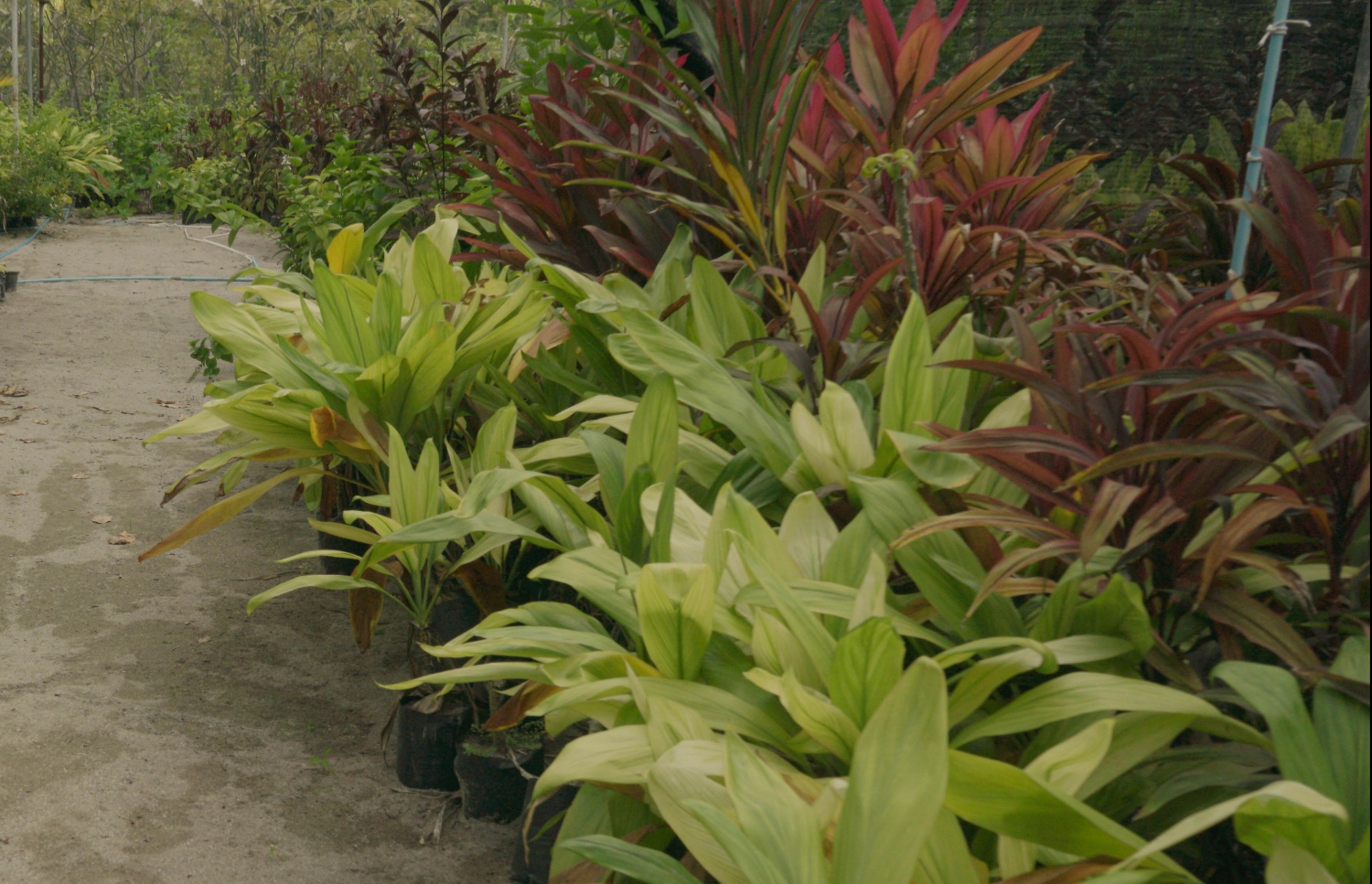
“Speaking of my beginnings career-wise, I spent some time on Reethi Rah Resort during its construction and pre-opening phases. During my time on the premises, I ended up acquiring some key skills. But again, it all comes back to carrying that torch for this field”, he smiles.
Bari, now having been in conversation with me about his favourite topic, surrounded by his beautiful green companions, seems to stand taller. Nature is his first love. She is what he dreams of, he knows her well and she rewards him for it.
“I’d call this business a very worthwhile venture. It is just the case that most young people don’t really count it among their options” Bari says, offering sagely for those that may consider such a path, “as with any business, the first step must be to understand how this market works, profit-earning potential and so on.”
“The difference is the more you delve into it, the more motivating it can be. Yeah, making a quick buck is the norm, and people get turned off by the initial prices. But when the order quantity is so high, even if the price per item seems low, we do collect a considerable pay off compared to other businesses and that too in bulk”. This time, the smile is a cheekily satisfied one.
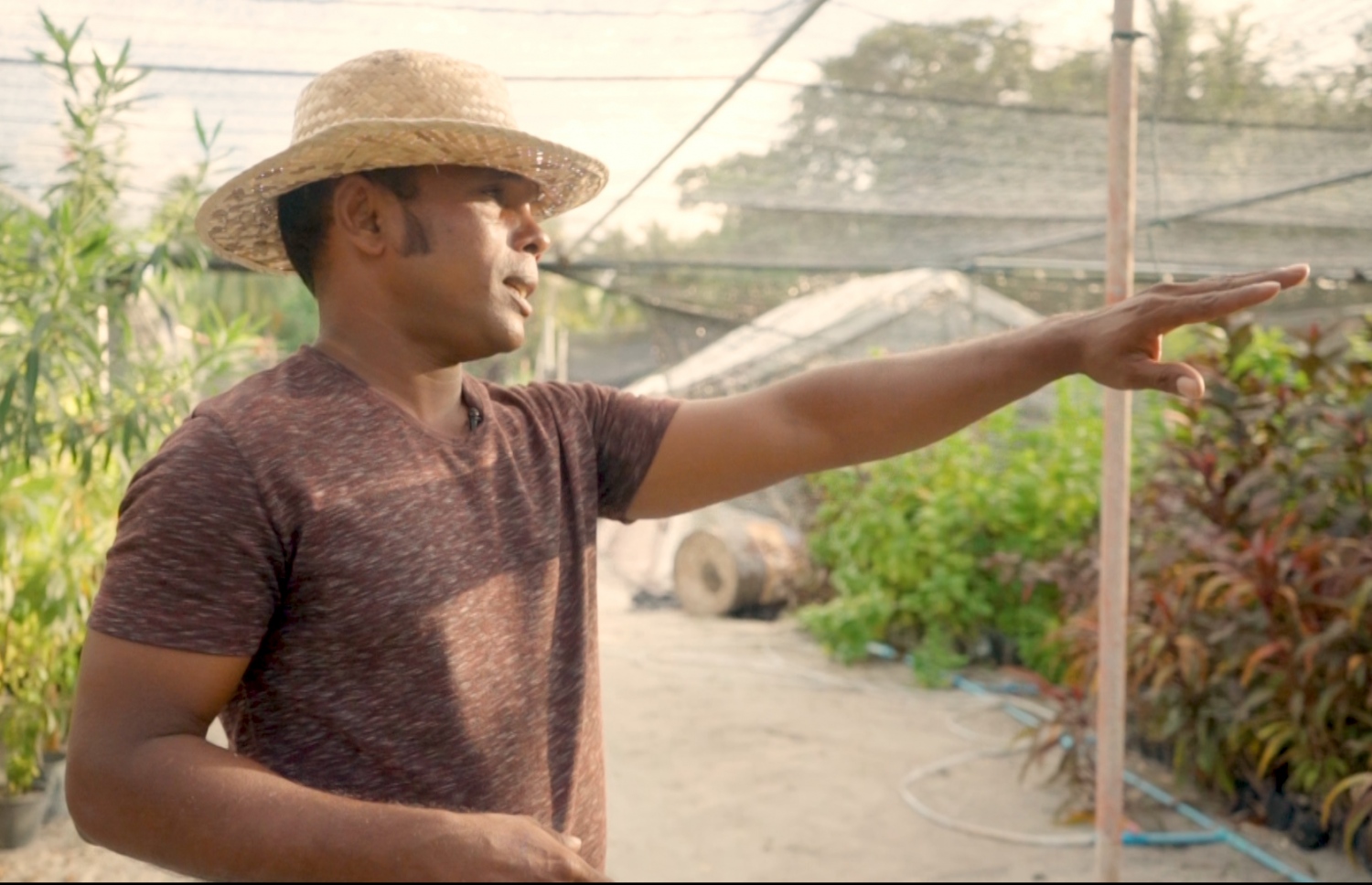
“Of course, not every order is a simple one. Certain plants are more challenging to grow than others. When using cuttings, for instance, the results can be unpredictable. Then again there are those like ‘Kuredhi’ which can grow new shoots in no time”, Bari again launches into horticulture and being an enthusiast I eagerly follow, though I shall spare readers the details. He reports a current fascination with germinating seedlings though and producing new varieties via cross-culture propagation.
But what green creation tugs this garden maestro’s heart above all else?
He chuckles. “They are all special”, Bari appears to brush off the question, rather paternally at that. “I don’t really find one that much more desirable than the other. But if you insist [- and I did], I think ‘Sai Maa’ maybe my favourite. As is ‘Hazaaru Maa’ (West Indian Jasmines). Perhaps it is white flowers that hold the most appeal”.
I look across the flower he is cradling, across the abundance of the island surrounding me and it all makes sense. This man, his work, and this island exist in harmony, to a divine arrangement. There is peace in this existence, one that in its essence, is incredibly Maldivian.
With a little envy, I walk away, leaving Bari to his magnificent work, happy in the knowledge that I have uncovered a story deserving of recognition that may otherwise pass untold. Of a viridescent spirit, happy in the knowledge that his purpose in life, is to nurture nature itself.